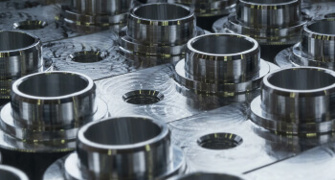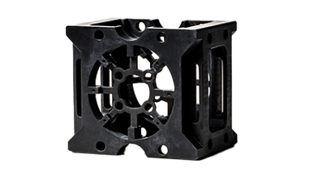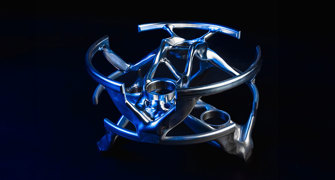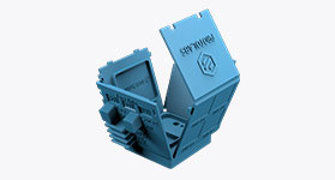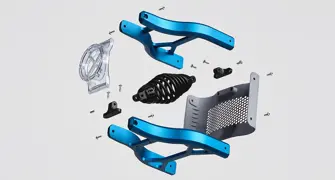Polycarbonate (PC): Understand the Key Benefits and Applications
Polycarbonate (PC) plastic is a versatile and durable thermoplastic polymer known for its exceptional impact resistance and natural transparency
PC is widely used in many industries due to its well-rounded mechanical properties. Multiple grades of PC are available through the following manufacturing services:
Advantages of Polycarbonate
- Transparency: PC is highly transparent, allowing for excellent light transmission. It is often used in applications where optical clarity is essential, such as eyeglass lenses and transparent protective shields.
- Impact resistance: One of the standout features of the material is its exceptional impact resistance. It is virtually unbreakable, making it ideal for applications where safety and durability are critical, such as in bulletproof glass, safety goggles, and automotive headlight lenses.
- Heat resistance: PC can withstand high temperatures without melting or deforming. It has a high glass transition temperature, making it suitable for applications that require exposure to elevated temperatures, such as microwave-safe cookware and LED light covers.
- Lightweight: Despite its strength, the material is relatively lightweight. With that, it is popular for weight reduction in industries like aerospace and automotive.
- UV resistance: PC has good resistance to ultraviolet (UV) radiation—applications might include greenhouse panels or protective covers for outdoor equipment.
- Electrical insulation: It is an excellent electrical insulator, often used in electrical and electronic components to prevent short circuits and electrical hazards.
Disadvantages of Polycarbonate
- Flammability: The material has a limited resistance to high temperatures and is not inherently flame retardant. Additives can be used to meet specific fire safety standards.
- Chemical sensitivity: PC can be sensitive to certain chemicals, solvents, and cleaning agents. It's important to select appropriate materials for cleaning and avoid exposure to incompatible chemicals.
- Cost: PC can be more expensive than some other plastics.
- Not suitable for food contact: Some types of PA may not be suitable for direct food contact due to concerns about potential leaching of bisphenol A (BPA). However, BPA-free polycarbonate options are available.

Applications of Polycarbonate
Polycarbonates high impact strength and transparency lends itself to being a common material across industries such as:
- Safety equipment: PC is used to make safety goggles, face shields, and helmets because of its excellent impact resistance and transparency.
- Optical lenses: It is used in eyeglass lenses and camera lenses due to its optical clarity and lightweight nature.
- Automotive: PC has several applications, including headlight lenses, interior components, and sunroofs, thanks to its impact resistance and lightweight properties.
- Electrical and electronic components: It is employed in electrical insulators, connectors, and LED light covers due to its electrical insulating properties.
- Medical devices: The material is used in various medical devices, such as incubators, surgical instruments, and dialysis machines, where transparency, sterilizability, and durability are important.
- Consumer products: It is used in a wide range of consumer goods like water bottles and food containers.
- Aerospace: PC is used in aircraft windows and interior components because of its lightweight and durable nature.
- Lighting: PC is used in light fixtures, fluorescent tube covers, and LED light diffusers for its ability to transmit and diffuse light effectively.
- Electronics: The material is used in the production of laptop and tablet casings, smartphone covers, and other electronic device components.
- Sporting goods: It is used in the manufacturing of helmets, protective gear, and sports goggles due to its impact resistance and lightweight nature.
- Signage and displays: PC is used for outdoor signs, display screens, and advertising materials due to its durability and UV resistance.

Polycarbonate is both transparent and durable, making it a popular material for numerous industries.
Plastics Similar to Polycarbonate
There are several materials that are similar to polycarbonate in depending on if transparency or impact resistance is required.
- Acrylic (PMMA): Like PC, acrylic is transparent and has good optical clarity. It is lightweight and offers UV resistance. Acrylic is not as impact-resistant as PC, but it can be a suitable alternative for applications where high impact resistance is not required, such as signage, aquariums, and display cases.
- PETG (Polyethylene Terephthalate Glycol-Modified): PETG is known for its transparency, impact resistance, and ease of thermoforming. It is often used as a safer alternative to PC in applications where there are concerns about the potential release of bisphenol A (BPA).
- Polyethylene (HDPE or LDPE): Polyethylene is a lightweight and impact-resistant plastic. It is commonly used in applications where chemical resistance and flexibility are more important than transparency, such as in bottles, pipes, and liners.
More Resources


